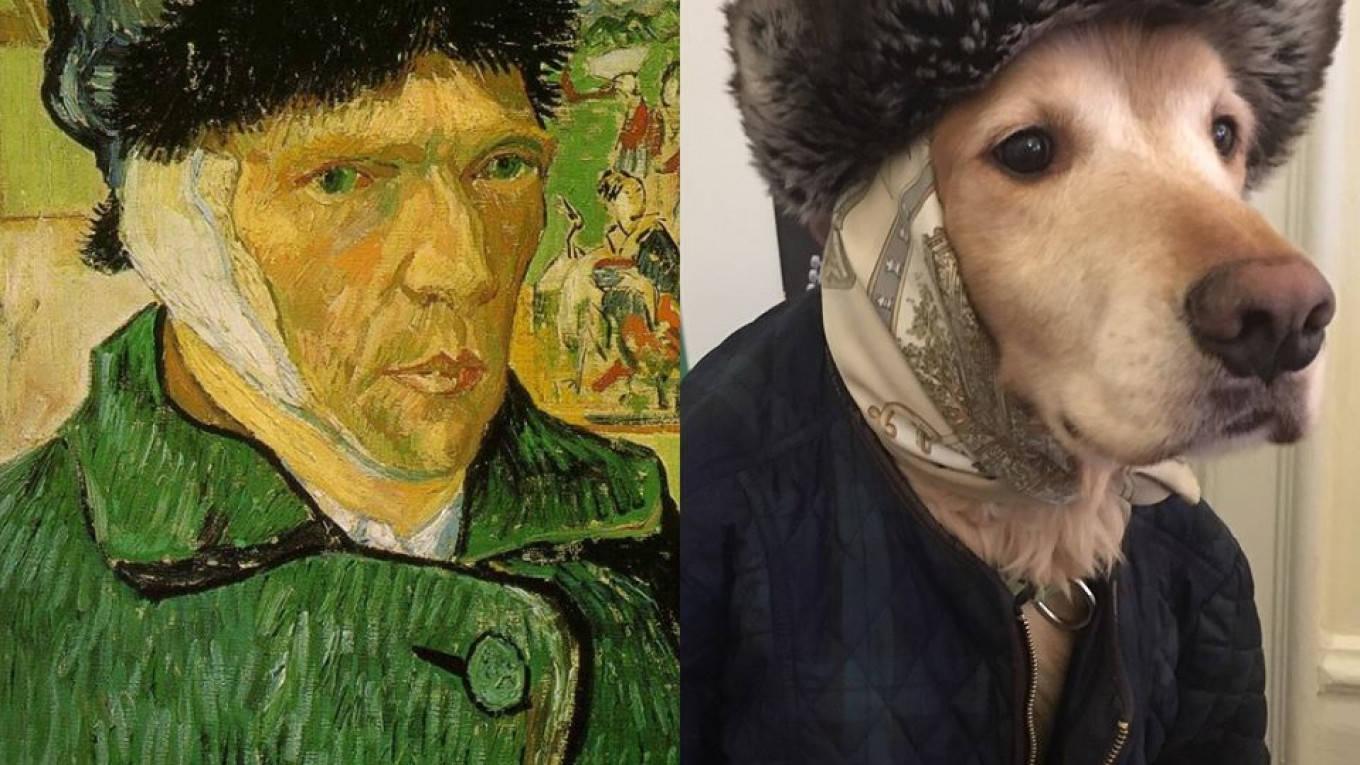From laying out shrimp to resemble Henri Matisse's "Dance" to cross-dressing and posing for Leonardo Da Vinci's "Lady with an Ermine," Russians have embraced a challenge to re-create famous artworks while under lockdown.
As boredom and restlessness set in under coronavirus quarantine, internet users are posting DIY versions of museum masterpieces in a Facebook group that is approaching 400,000 members.
"The proliferation of our project has been even more exponential than that of the virus," jokes Yekaterina Brudnaya-Chelyadinova, who founded the Izoizolyatsia (Artistic Isolation) group to fight lockdown blues.
The group follows similar artwork challenges started in March by Getty Museum and some dedicated Instagram accounts, but Russians seem to have heeded the call with particular gusto.
Brudnaya-Chelyadinova, a 38-year-old employee of Mail.ru group, said she was initially looking for a distraction when she posted a photo of her husband dressed up as Vincent Van Gogh's famous self-portrait.
"It was easy to do with an old straw hat found in the closet and a quick red dye for his beard," she told AFP.
In response to her post, she received an elaborate recreation of Marc Chagall's "The Lovers." A couple pretended to fly through the sky by perching on a stool, with the city below built out of Legos.
"And it was off," she says.
One of the masterpieces created from what's found around the house was "Dance" by Matisse, which shows pink dancers in a circle.
The version posted by Natalia Shevchenko constructed the dancers out of boiled shrimp and walnuts, laid out on a blue plastic bag. The remarkably effective result has garnered a thousand shares.
The rules are strict: any photo editing software is prohibited, and only pictures taken at home can be posted.
But even with these restrictions, participants have let their imaginations run wild, the output often hilarious with a touch of self-deprecation.
One couple posted three images made in their Saint Petersburg flat, including Rembrandt's "The Return of the Prodigal Son."
"The lockdown situation isn't easy, but we're hoping for the best, that's why we chose this painting," explained 48-year-old Ruben Monakhov, himself a professional artist.
In their version of the Rembrandt, Ruben is the happy father embracing his wife posing as the prodigal son, kneeling with a dirty bare foot sticking out from under her bathrobe.
The group features participants of all age groups and generous use of pets. One spaniel stands in for Albrecht Durer in his curly-haired self-portrait.
One Facebook user from the Moscow region, Polina Vasilyeva, posted a popular version of Ivan Kramskoi's "Portrait of The Unknown Woman," interpreted by her 88-year-old grandmother in her living room.
"We began participating in this great project for our grandmothers," Vasilyeva wrote.
"And today, she made this. Isn't she great?"
A Message from The Moscow Times:
Dear readers,
We are facing unprecedented challenges. Russia's Prosecutor General's Office has designated The Moscow Times as an "undesirable" organization, criminalizing our work and putting our staff at risk of prosecution. This follows our earlier unjust labeling as a "foreign agent."
These actions are direct attempts to silence independent journalism in Russia. The authorities claim our work "discredits the decisions of the Russian leadership." We see things differently: we strive to provide accurate, unbiased reporting on Russia.
We, the journalists of The Moscow Times, refuse to be silenced. But to continue our work, we need your help.
Your support, no matter how small, makes a world of difference. If you can, please support us monthly starting from just $2. It's quick to set up, and every contribution makes a significant impact.
By supporting The Moscow Times, you're defending open, independent journalism in the face of repression. Thank you for standing with us.
Remind me later.






